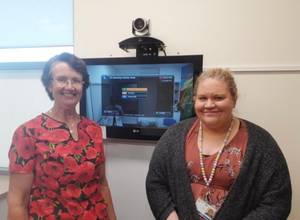Lymphoedema patients benefit from telehealth trial

It was just after Christmas in 2018 when Susan Ham found out she had breast cancer.
The year that followed involved regular travel, as well as time away from home, to receive chemotherapy at Royal Perth Hospital (RPH) and radiotherapy at Fiona Stanley Hospital (FSH).
When she felt the symptoms of Lymphoedema set in a year later, Susan was disheartened at the possibility of having to spend more time on the road and away from home for treatment.
Asked by her physiotherapist if she’d like to be a part of a TeleLymphoedema trial, which would see her utilising telehealth to be treated for her lymphoedema from her local hospital, Susan jumped at the opportunity.
“This all happened right when I was about to return to work and I was not looking forward to perhaps having to go through another round of travelling from Katanning to Perth for treatment – I was just over it.
“I’m so grateful that I could be treated locally, taking 20 minutes out of my life for an appointment via telehealth, rather than eight or more hours,” Susan said.
Susan’s is one of many stories heard this Telehealth Awareness Week (19-23 October), where the WA Country Health Service (WACHS) is shining a spotlight on how digital technology is having a positive impact on country people.
Susan’s telehealth appointments involved treatment from the local physio or occupational therapist under instruction from a specialised lymphoedema physiotherapist from FSH who participated in the therapy session via videoconference.
“It was amazing,” Susan said.
“It’s probably the most intricate telehealth I’ve ever been involved in – I’ve never experienced anything so technical.”
Acting Senior Occupational Therapist with the Katanning Health Service, Julia Fjeldsted, explained that once the TeleLymphoedema service was established, local clinicians were able to assist patients with more advanced management of their Lymphoedema symptoms.
“Treating Lymphoedema is a very specialised area,” Julia explained.
“This new service has meant that we’ve upskilled and after the first few sessions, I definitely felt more confident and have a much better understanding of the particular techniques required to get the best outcomes for patients.”
Susan, who has now returned to work full time, said she feels very lucky to have been a part of this ground-breaking trial.
“My symptoms and discomfort have been brought under control,” she said.
“I’ve also been given the tools and techniques to self-manage this condition long-term, knowing that if I ever need that specialised treatment and care again, the use of telehealth means I can receive it from right here in my home town.”
Susan also utilises telehealth for her follow-up appointments at RPH.
“It’s been so beneficial for me to have been able to stick with my oncologist at RPH, while also receiving additional care through TeleLymphoedema.”
WACHS Great Southern Regional Director Geraldine Ennis said the organisation’s telehealth capability rapidly expanded as a result of COVID-19.
“WACHS has always been a global leader in innovative thinking when it comes to harnessing technology to deliver equitable healthcare to regional and remote communities.
“Susan’s story is a fantastic reminder of our priority to ensure country people receive world-class healthcare as close to home as possible.”
Check with your health professional to see if a telehealth appointment is right for you. For more information visit the HealthyWA website.

